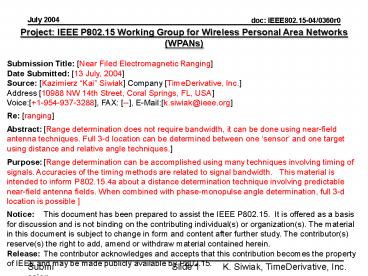Near Field EM Ranging
Title:
Near Field EM Ranging
Description:
Four antennas (elevation and azimuth phase monopulse gives angle in two dimensions! ... Azimuth Monopulse Tracking with Near Field Ranging 'a' 'b' r found from ... –
Number of Views:19
Avg rating:3.0/5.0
Title: Near Field EM Ranging
1
Project IEEE P802.15 Working Group for Wireless
Personal Area Networks (WPANs) Submission Title
Near Filed Electromagnetic Ranging Date
Submitted 13 July, 2004 Source Kazimierz
Kai Siwiak Company TimeDerivative,
Inc. Address 10988 NW 14th Street, Coral
Springs, FL, USA Voice1-954-937-3288, FAX
--, E-Mailk.siwiak_at_ieee.org Re
ranging Abstract Range determination does not
require bandwidth, it can be done using
near-field antenna techniques. Full 3-d location
can be determined between one sensor and one
target using distance and relative angle
techniques. Purpose Range determination can be
accomplished using many techniques involving
timing of signals. Accuracies of the timing
methods are related to signal bandwidth. This
material is intended to inform P802.15.4a about a
distance determination technique involving
predictable near-field antenna fields. When
combined with phase-monopulse angle
determination, full 3-d location is possible
Notice This document has been prepared to
assist the IEEE P802.15. It is offered as a
basis for discussion and is not binding on the
contributing individual(s) or organization(s).
The material in this document is subject to
change in form and content after further study.
The contributor(s) reserve(s) the right to add,
amend or withdraw material contained
herein. Release The contributor acknowledges and
accepts that this contribution becomes the
property of IEEE and may be made publicly
available by P802.15.
2
Location Using Near Field Techniques
- K. Siwiak, TimeDerivative, Inc.
3
Location Doesnt Need Bandwidth
- Distance measurements do not need large
bandwidths - Accuracies of centimeters are possible at Very
Low Frequencies - Time is not the only parameter to carry
distance information - Low frequency near-field techniques may be
employed Near Field EM Ranging
4
Small Loop E and H Fields
5
E and H Near Field Tracking
- Electric and Magnetic fields 90 deg out of phase
in the near field in-phase far away - Phase difference varies predictably from 90 deg
at antenna to 0 deg in far zone - Good transition region between 0.05 and 0.4
wavelengths for accurate distance tracking
6
Basis of Near-Field Tracking
Based on Technical Introduction to Near Field
Tracking, (Online) lthttp//www.q-track.comgt
Q-Track Corp., 2003.
7
Phase Difference Yields Distance
8
Near Field Tracking Accuracy
Data Courtesy of Q-Track Corporation
9
Can Be Used with Phase Monopulse Techniques for
Location
- The relative angle f to a signal can be found by
signals a and b form two closely spaced
antennas A and B - Arithmetic network used to form ab and a-b
signals - The ratio (a-b)/(ab) is proportional to angle f
- Technique is called phase monopulse and was
associated with tracking systems over the past 40
years or so - Four antennas (elevation and azimuth phase
monopulse gives angle in two dimensions!
10
Azimuth Monopulse Tracking with Near Field Ranging
H-field
f found from phase monopulse on Ea , Eb
emitting target
a
r found from E, H phase
E-field
b
Can do similar phase monopulse in azimuth and
elevation for full three dimensional LOCATION
11
Summary / Conclusions
- The phase difference between E and H fields
directly relates to distance - Phase difference in the range 0.05 to 0.4
wavelengths is suitable for accurate distance (r)
measurements - Requires just a sinusoidal signal
- Can be used with angle determination (in one or
two planes) to get location coordinates (r, f)
12
Resources and Information
- Q-Track
- http//www.q-track.com































